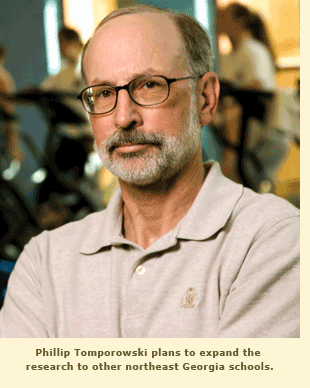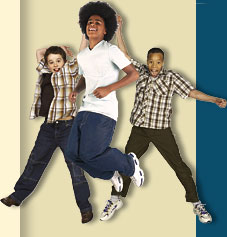Building Bodies, Boosting Brains
A UGA-MCG study shows that exercise improves children’s cognition—particularly their planning and problem-solving skills.
Many people claim to get their best ideas while on the elliptical machine, doing laps in the pool, or jogging along a quiet road, and scientists have consistently documented that exercise provides adults with cognitive benefits. But what about children? Does physical activity help kids perform in the classroom, as well as later in life?
While some public schools across the nation are reducing or eliminating time for recess and physical education in their daily class schedules, a recent study—conducted by a partnership of researchers at the University of Georgia, the Medical College of Georgia (MCG), and George Mason University—has found that exercise has a positive effect on children’s cognitive functioning. Physical activity is especially beneficial for the part of mental processing that controls decision-making and problem-solving.
 The study, published in the December 2007 issue of Research Quarterly for Exercise and Sport, is one of only a few systematic investigations of the impacts of exercise on children’s cognitive ability, said investigator Phillip D. Tomporowski, director of the Cognition and Skill Acquisition Laboratory at UGA’s College of Education. Tomporowski first proposed the idea for the study to Catherine L. Davis, a clinical health psychologist at MCG.
The study, published in the December 2007 issue of Research Quarterly for Exercise and Sport, is one of only a few systematic investigations of the impacts of exercise on children’s cognitive ability, said investigator Phillip D. Tomporowski, director of the Cognition and Skill Acquisition Laboratory at UGA’s College of Education. Tomporowski first proposed the idea for the study to Catherine L. Davis, a clinical health psychologist at MCG.
“I was starting a large-scale clinical trial of aerobic-exercise training in overweight children, and I saw this as an opportunity to test [the exercise-cognition] hypothesis in the children,” said Davis, who became the study’s principal investigator. “Any cognitive benefit in children could have lifelong implications for development and achievement.”
The results revealed that there is indeed a relationship between exercise and children’s “executive functioning,” the area of mental processing that allows a person to create strategies for solving a problem, monitor his or her progress, and make adjustments if needed. The significance of executive functioning isn’t limited to solving homework problems; it has been tied to children’s empathy, imagination, creativity, and self-evaluation in general.
Poor executive function can negatively affect school or work performance, social behavior, and self-control. Thus it could be one reason for some children’s hyperactive and impulsive behavior in the classroom and may even be related to some high-school students’ decisions to drop out of school, Tomporowski said.
The parts of the brain that process executive functioning develop from early childhood through adolescence; an especially important period is a child’s elementary-school years. To examine whether children’s mental processing could benefit from exercise during this dynamic phase of growth, 94 overweight kids between 7 and 11 years old from the Augusta, Georgia, area were selected for the program and randomly sorted into groups. Every day after school for 15 weeks, the children in the test groups played tag, jumped rope, ran laps around the gymnasium, and played modified games of basketball and soccer. The emphasis was on making the exercise vigorous and enjoyable rather than competitive. There was even a reward system, offering prizes in exchange for points that the children earned during the week, to keep them motivated.
To measure the kids’ mental processing ability, researchers used a test called the Cognitive Assessment System (CAS), which is based on the Planning, Attention, Simultaneous, and Successive cognition (PASS) theory derived from the work of Russian neuropsychologist Alexander Luria. The CAS measures a person’s ability to solve a problem and reach a goal—to pay attention to a single stimulus while ignoring others, simultaneously process all the parts of a question, and process information in sequence. Jack A. Naglieri, director of the School Psychology Program at George Mason University, helped develop the test and assess the results.
The group that exercised for 40 minutes each day showed the most improvement on the CAS, while a second group, which exercised for 20 minutes a day, also showed some improvement. The kids who participated in the highest exercise regimen of the program scored higher than the control group of students who did not change their daily activity level. These results were similar to those of studies that examined adults’ cognition, Tomporowski said.
The study’s results were also consistent with research suggesting that normal-weight children perform better in the classroom than do their overweight peers.
Davis hopes that educators and policymakers will respond to the study’s findings by increasing kids’ opportunities for vigorous physical activity in school. “Besides improving cognition, this would have major benefits for children’s health and for our nation’s health care expenditures,” she said.
Meanwhile, Tomporowski plans to expand the research to include students in other northeast Georgia schools. “I’d also like to see transitional research from lab to school, which would help solve real problems, like reducing the dropout rate,” he said.
For more information, contact Phillip Tomporowski at: ptomporo@uga.edu
(Catharin Shepard is a College of Education graduate assistant and a master’s student in journalism and mass communication).
 |


